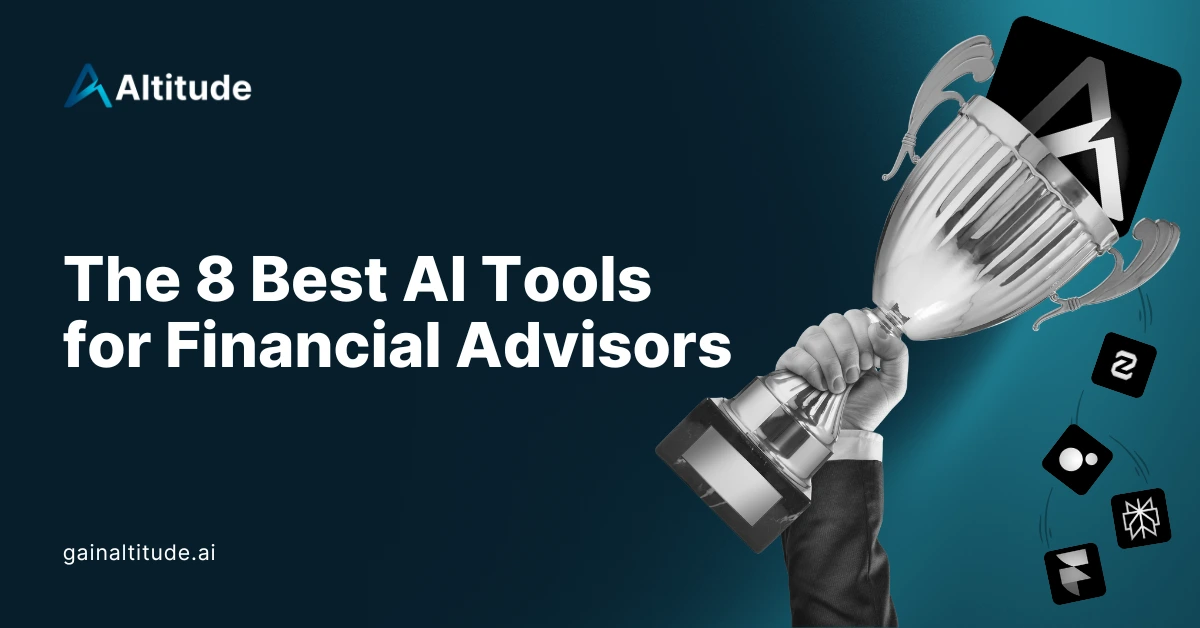Artificial intelligence is no longer just a buzzword in Silicon Valley. It’s become a real game-changer in financial services and wealth management. For today’s financial advisors, the right AI tools can make the difference between a firm that’s always playing catch-up and one that’s confidently growing AUM, streamlining workflows, and serving clients at the highest level.
Think about all the time-consuming tasks that eat up your day:
- Taking meeting notes and remembering details
- Sending follow-up emails after every client meeting
- Organizing mountains of client data
- Keeping up with social media and marketing
- Forecasting portfolios and tracking financial goals
This is where AI-powered technology steps in. From generative AI assistants that write compliant content to CRM platforms that keep your client base organized in real time, these tools are reshaping how financial advisers work.
But here’s the key: not all AI-driven software is created equal. Some focus on note-taking, some on content creation, and others on big-picture financial planning. The real winners are the ones that help you automate, optimize, and strengthen your client relationships without adding complexity.
In this article, we’ll cover the 8 best AI tools for financial advisors, breaking down their use cases, pros, and cons. And while tools like ChatGPT, Claude, and even Wealthbox or Redtail have their strengths, you’ll quickly see why Altitude rises above them all.
Why Financial Advisors Should Use AI in 2025
The world of wealth management is changing fast. Clients expect personalized service, instant answers, and a smooth experience at every step of the journey. For financial advisors, that means juggling more tasks than ever before. The problem? Most of those tasks are repetitive, manual, and, frankly, not the best use of your time.
That’s where AI tools step in. They help you automate the busy work so you can focus on giving better financial advice and growing your client base.
Here are just a few use cases for AI in financial services:
- Automating follow-up emails so no prospect or client falls through the cracks
- Note-taking during client meetings and surfacing insights from conversations in real time
- Analyzing client data for trends, risks, and opportunities
- Running sentiment analysis on communications to better understand client needs
- Generating compliant, AI-generated content for newsletters and social media
- Building smarter workflows that streamline scheduling, reminders, and reporting
For financial professionals, AI isn’t about replacing you. It’s about giving you an AI assistant that works in the background, taking care of the time-consuming tasks and optimizing the overall client experience.
Whether you’re a solo CFP, part of a large advisory firm, or leading a wealth management team, learning how to use AI effectively is becoming a must-have skill.
1. Altitude CRM: The Best AI Tool for Financial Advisors
When it comes to AI-powered CRMs, there’s one clear standout: Altitude. Unlike other platforms that simply bolt artificial intelligence onto an existing system, Altitude was built from the ground up as an AI CRM for financial advisors and wealth management firms.
At the center of Altitude is Pathfinder+, your AI meeting co-pilot. Pathfinder+ doesn’t just take notes. It attends your meetings, creates accurate summaries, and then executes. That means it can automatically:
- Create and assign follow-up tasks
- Update client records inside Altitude in real time
- Organize client data for easy reporting
- Keep everything compliant within your existing workflows
Why Altitude leads the pack:
- Advisor-specific functionality: Designed for CFPs, RIAs, and advisory firms, not generic sales teams.
- AI assistant that executes: Pathfinder+ goes beyond transcription, directly updating tasks, workflows, and notes in the CRM.
- All-in-one platform: Combines CRM, marketing automation, compliance, and practice management.
- Optimization made simple: Smarter workflows mean less admin and more time with clients.
- Compliance built in: Designed with FINRA and SEC requirements in mind.
Pros
- Purpose-built for the financial services industry
- Automates time-consuming tasks like follow-up emails, reporting, and meeting records
- Easy integrations with tools like Redtail, Wealthbox, Microsoft Outlook, and Excel
- Enhances user experience with clear dashboards and intuitive navigation
Cons
- Best suited for financial advisors (not a problem if that’s you)
- As a newer CRM, it’s still expanding third-party integrations
Bottom line: Altitude doesn’t just let you use AI. It makes AI the core of how you run your practice. With Pathfinder+, you’re not just getting a meeting assistant—you’re getting an AI teammate that takes action for you.
2. Jump AI: Best for Smarter Client Meetings
If client meetings are the heart of your business, Jump AI is a great helper. It’s an AI-driven meeting assistant that makes prep easy and cuts down on repetitive admin.
What Jump AI does best:
- Meeting prep made easy: Auto-delivers talking points based on client data before every meeting.
- Automated admin: Drafts meeting notes, tasks, and follow-up emails for you to approve.
- Compliance built-in: Keeps workflows secure and within your preset compliance rules.
- Sentiment analysis: Detects client emotions and highlights opportunities you might miss.
Pros
- Saves hours on time-consuming admin tasks
- Helps you show up fully prepared for every client meeting
- Surfaces hidden opportunities through sentiment analysis
- Compliance-friendly automation
Cons
- Strong for meetings but stops short of true execution
- Needs to be paired with a CRM platform like Wealthbox or Redtail to handle follow-ups and client data updates automatically
Bottom line: Jump AI is a solid meeting companion, but it mainly prepares and suggests. With Pathfinder+ inside Altitude, the difference is execution. Pathfinder+ not only prepares and takes notes but also updates records and triggers workflows, so nothing gets lost between your meetings and your CRM.
3. Zocks: Best for Scheduling and Meeting Flow
Zocks is another tool aimed at making client meetings easier, with a focus on scheduling and keeping everything organized before and after the conversation. Think of it as a lighter-weight AI assistant that reduces the small but time-consuming tasks that pile up during your week.
What Zocks does best:
- Smart scheduling: Automates calendar management and sends reminders to clients
- Meeting support: Can join calls to capture meeting notes and draft summaries
- Follow-up help: Suggests tasks and follow-up actions after meetings
- Workflow integration: Works with existing calendars and communication tools
Pros
- Saves time by handling scheduling logistics
- Useful for note-taking and follow-up support
- Easy to adopt and user-friendly
Cons
- Meeting-focused, not a full CRM
- Drafts notes and follow-ups but doesn’t execute them inside your firm’s system
- Limited functionality compared to AI-powered platforms like Altitude
Bottom line: Zocks is helpful for simplifying meetings and reducing manual scheduling. But when it comes to turning those meeting insights into actual action—like creating tasks, updating client data, or aligning with your CRM workflows—you’ll need more than Zocks can offer. That’s where Pathfinder+ inside Altitude separates itself. It doesn’t just listen. It acts.
4. Finmate AI: Best for Meeting Summaries and Follow-Ups
Finmate is another AI meeting assistant designed to make client meetings smoother. Like Jump and Zocks, it focuses on handling the small but time-consuming tasks that pile up before and after conversations.
What Finmate does best:
- Pre-meeting prep: Gathers key talking points from client data to help you show up prepared
- Real-time note-taking: Captures details from meetings and produces clean summaries
- Follow-up drafting: Suggests emails and tasks so you can act quickly
- Workflow support: Helps streamline communication but requires syncing with a CRM for execution
Pros
- Strong for drafting meeting notes and summaries
- Saves time on manual follow-up emails
- Helps maintain consistency across client service
Cons
- Doesn’t update your client base or records directly
- Requires pairing with a CRM like Redtail, Wealthbox
- Stops short of true execution
Bottom line: Finmate can make your client meetings more productive, but it’s only a helper. To actually streamline workflows and keep everything in sync, you need a platform that combines meeting insights with your CRM functionality. That’s where Pathfinder+ inside Altitude stands apart, it doesn’t just summarize, it executes.
5. Zeplyn: Best for Compliance-Focused Meeting Notes
Zeplyn is another AI meeting assistant, but it sets itself apart with a strong emphasis on security and compliance. Designed specifically for financial advisors, Zeplyn captures meeting intelligence while keeping sensitive client data protected.
What Zeplyn does best:
- Secure and compliant: Uses end-to-end encryption, recording-free note-taking, and strict PII protection to safeguard data
- Meeting intelligence: Captures real-time notes, action items, and client details like goals, preferences, and life events
- Workflow automation: Syncs notes and tasks to your CRM with one click
- Client engagement: Drafts personalized follow-up emails so you can reconnect quickly
- Client intelligence: Prepares smart meeting recaps and agendas to simplify prep
Pros
- Strong compliance and security focus
- Helps strengthen client relationships through detailed notes and follow-ups
- Reduces manual prep and admin before and after meetings
- Customizable templates for client service and engagement
Cons
- Notes and tasks still need to be synced manually to your CRM
- Doesn’t directly execute updates or automate workflows inside your system
- Works best as an add-on, not a standalone solution
Bottom line: Zeplyn is a solid choice if compliance is your top concern. It can help you capture meeting details and reduce the time-consuming prep that drains productivity. But like other meeting assistants, it still needs to be paired with a CRM. By comparison, Pathfinder+ inside Altitude integrates notes, tasks, and follow-ups directly into your system, removing the extra steps.
6. Perplexity: Best for Real-Time Research
Sometimes clients ask tough questions on the spot. That’s where Perplexity comes in. It’s an AI-powered search engine designed to deliver quick, cited answers in real time. For financial advisers, that means being able to check market data, tax information, or general financial advice insights without spending hours digging.
What Perplexity does best:
- Quick research: Answers complex questions in seconds with references
- Meeting support: Can be used during client meetings to double-check facts or provide clarity
- Client service aid: Helps you prepare personalized service by pulling insights from across the web
- Integration potential: Can pair with chatbots or be embedded into workflows for faster responses
Pros
- Saves time on research and prep
- Gives you cited answers you can trust
- Helpful for creating ai-generated content like blogs, newsletters, or FAQs
- Easy to use for both solo CFPs and larger advisory firms
Cons
- General-purpose, not built for wealth management firms specifically
- Risk of relying too heavily on public data that may need compliance review
- Doesn’t integrate directly into CRMs like Altitude or Redtail
Bottom line: Perplexity is a handy research companion for financial professionals. It’s not a replacement for specialized AI tools like Altitude, but it can help you find answers quickly and support better client meetings and presentations.
7. ChatGPT: Best for Content and Communication Support
If you’ve heard about generative AI, you’ve heard about ChatGPT. Built on advanced LLMs (large language models), ChatGPT is one of the most flexible AI tools around. For financial advisors, it’s especially useful for creating drafts, brainstorming ideas, and saving time on communication.
What ChatGPT does best:
- Content creation: Drafts blog posts, newsletters, and social media updates
- Client communication: Helps you write polished follow-up emails or client letters
- Research aid: Can summarize articles, reports, and even market data
- Chatbots: Can power AI-driven bots for websites or client portals
Pros
- Highly flexible with countless use cases
- Great for reducing time-consuming writing tasks
- Supports financial advisers with brainstorming and idea generation
- Can integrate into workflows through third-party apps
Cons
- Not designed specifically for financial services
- Content always requires compliance checks before sharing with clients
- Doesn’t manage or update client data in your CRM
Bottom line: ChatGPT is a powerful tool for boosting productivity and communication. But it’s still a general-purpose platform. To truly streamline client service and tie communication into your workflows, pairing it with an advisor-focused tool like Altitude is the smarter move.
8. Claude: Best for Document Review and Summaries
Claude, created by Anthropic, is another AI-powered assistant built on LLMs. While it works in a similar space to ChatGPT, Claude shines at handling longer text and producing clear, structured outputs. For financial professionals, that makes it a useful sidekick for reviewing contracts, estate planning documents, or lengthy client communications.
What Claude does best:
- Document review: Summarizes long agreements, reports, or compliance-heavy text
- Meeting notes: Can analyze and condense large blocks of conversation
- Client prep: Helps organize background info for client meetings
- Clarity: Designed with a focus on safe, interpretable answers
Pros
- Excellent at simplifying complex material
- Strong for note-taking and prep
- Helps save time on time-consuming document reviews
- Useful for creating drafts of client letters or internal summaries
Cons
- Not designed for the financial services industry
- Doesn’t integrate with CRM platforms like Redtail, Wealthbox, or Altitude
- Requires manual oversight to ensure compliance
Bottom line: Claude is a solid general-purpose AI assistant that makes long, complicated documents less painful to handle. But like ChatGPT, it’s not built for financial advisors specifically. The real edge comes from tools like Altitude, where meeting intelligence, compliance, and workflow automation are baked in from the start.
Final Thoughts: Choosing the Best AI Tool for Your Firm
There’s no question that AI tools are reshaping the way financial advisors work. From drafting content with GPT models to automating meeting notes with specialized assistants, these technologies are making it easier than ever to serve clients, win a new client, and grow a practice.
General-purpose tools like ChatGPT and Claude can speed up communication. Meeting-focused assistants like Jump, Zocks, Finmate, and Zeplyn help with admin and prep. Research platforms like Perplexity bring answers in real time. They all have value. But they’re still just pieces of the puzzle.
For a tool that brings everything together—portfolio management, client service, compliance, and workflows—you need more than a meeting note-taker or chatbot.
You need an AI-powered CRM that understands the realities of wealth management, fintech innovation, and the unique challenges of serving high-net-worth clients.
That’s exactly what you get with Altitude. By combining the best of machine learning with an advisor-specific platform, Altitude makes AI part of your entire business strategy. From finding your next opportunity to nurturing client relationships at scale, it’s the one solution that goes beyond suggestions and actually executes.
In short:
- If you want quick answers, Perplexity is solid.
- If you want help with writing, GPT tools like ChatGPT or Claude deliver.
- If you want meeting support, Jump, Zocks, Finmate, and Zeplyn have their place.
- But if you want it all—automation, execution, and growth built for financial advisors—the clear winner is Altitude.



